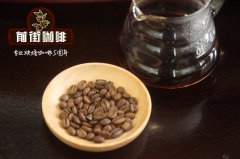Introduction of Yunnan Coffee varieties description of the characteristics of Yunnan small Grain Coffee Iron Card

Professional coffee knowledge exchange more coffee bean information please follow the coffee workshop (Wechat official account cafe_style)
Qianjie-knowledge sharing of Yunnan Coffee varieties and Coffee varieties
Arabica
Also known as small coffee beans, originated in Ethiopia. Arabica coffee trees mostly grow at an altitude of 1000 ℃ 2000 meters above sea level; they are hardy, and the suitable growth temperature is 15 mures and 24 meters; they need more humidity, and the annual rainfall is not less than 1500 milliliters; at the same time, they also have higher requirements for cultivation techniques. Arabica coffee tree is a large shrub with oval, dark green leaves and oval fruit. Generally, there are two slightly flattened beans with long oval on the front, narrow and curved cracks in the middle, S-shaped, and smooth arc on the back of the beans. Caffeine content is about 0.8% Rue 1.5%.
Arabica coffee's excellent flavor and aroma make it the only coffee that can be drunk directly and alone among these native species, such as the Blue Mountains of Jamaica, Mantenin of Indonesia, Yega Snow Coffee and Brazilian Coffee. However, it has weak resistance to dryness, frost, diseases and insect pests, especially leaf rust, which is the biggest natural enemy of coffee, so all producing countries are committed to improving varieties.
Arabica coffee produced in different regions, different elevations and different climates has its own characteristics and can show completely different individual flavor. It smells like grass when it is not baked, and after proper baking, it shows "fruity" (medium-shallow baking) and "caramel flavor" (deep baking). Suitable for a single origin and a variety of mixed beans, can be made using a variety of extraction techniques.
Robusta
Also known as medium-grain coffee beans, originated in the Congo of Africa. Robusta coffee trees are mostly planted in lowlands 200-800m above sea level. They like warm climates and require temperatures of 24-29 ℃, but do not require high rainfall. However, the variety relies on insects or wind to pollinate, so coffee takes 11 months from pollination to fruit, which is longer than Arabica.
Yunnan small-grain coffee, Rubiaceae, coffee genus, the planting area is mainly distributed in Lincang, Baoshan, Simao, Xishuangbanna, Dehong and other states. Small grains of coffee are native to Ethiopia or Arabian Peninsula.
Yunnan small grain coffee varieties
Iron pickup (typica)
Tieka Coffee, native to Ethiopia and southeastern Sudan, is the most widely cultivated variety of coffee in the Western Hemisphere. The plant is stronger, but not light-tolerant, and the yield is higher in Hawaii. The top leaf of the iron pickup is red copper, which is called red top coffee. Iron pickup is a recognized boutique coffee variety, at present, many commercial improvements are derived from this. The taste is excellent, but the output is extremely low and vulnerable to rust, which requires more manpower management.
The Ironpika bean is slender, the tree is tall, the fruit is oval, and the branches are slightly inclined. The four iron pickups are slender and open, tilting at an angle of 50 to 70 degrees. The coffee yield of each tree is very low, but the cup test score is very high.
Knowledge expansion: the value of Robusta is not as a negative example to set off the advanced flavor of Arabica, but has an unshakable position in Italian beans. Italian blending will add a small amount of Robusta to the blend to increase the alcohol thickness of the coffee and produce a more oil-rich Espresso.
END
Important Notice :
前街咖啡 FrontStreet Coffee has moved to new addredd:
FrontStreet Coffee Address: 315,Donghua East Road,GuangZhou
Tel:020 38364473
- Prev

Introduction of Yunnan Coffee producing areas introduction of the Flavor characteristics of Yunnan small-grain Coffee Katim and Iron pickup
Professional coffee knowledge exchange more coffee bean information please follow the coffee workshop (Wechat official account cafe_style) Qianjie-Yunnan coffee producing areas, variety knowledge sharing Yunnan's main coffee producing areas are: Pu'er, Baoshan, Dehong, Xishuangbanna and Lincang. Katim is the main variety of coffee grown in Yunnan, and there are also some iron pickups and bourbon. In recent years, many new coffee varieties have been planted.
- Next

A brief introduction to the Taste of Yunnan small Coffee an Analysis of the reasons for the weak Coffee made by hand
Professional coffee knowledge exchange more coffee bean information please follow the coffee workshop (Wechat official account cafe_style) front street-Yunnan iron pickup coffee, hand-brewed coffee flavor light knowledge sharing Yunnan coffee due to the unique geographical environment and climatic conditions, formed a strong but not bitter, fragrant but not strong, with a little fruity unique flavor, world-class coffee experts evaluation is good all over the world
Related
- Beginners will see the "Coffee pull flower" guide!
- What is the difference between ice blog purified milk and ordinary milk coffee?
- Why is the Philippines the largest producer of crops in Liberia?
- For coffee extraction, should the fine powder be retained?
- How does extracted espresso fill pressed powder? How much strength does it take to press the powder?
- How to make jasmine cold extract coffee? Is the jasmine + latte good?
- Will this little toy really make the coffee taste better? How does Lily Drip affect coffee extraction?
- Will the action of slapping the filter cup also affect coffee extraction?
- What's the difference between powder-to-water ratio and powder-to-liquid ratio?
- What is the Ethiopian local species? What does it have to do with Heirloom native species?

